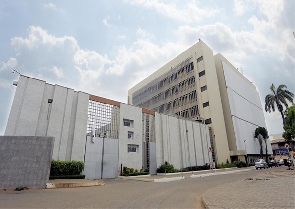A financial analyst, Dr. Courage Edwards has opined that the banking sector reforms undertaken by government, have strengthened local banks and made them more resilient to shocks. This comes after the Speaker of Parliament, Alban Bagbin had suggested that government erred in its decision not to support local banks to succeed at the time of the clean-up exercise. Dr. Edwards speaking in an interview with GhanaWeb Business explained that the banking sector clean-up exercise had become necessary after the International Monetary Fund mooted the decision for the Bank of Ghana to undertake reforms as part of IMF’s conditions. “I think maybe, the Speaker does not understand the essence of the reforms that took place in the clean-up exercise because if you assess the balance sheets of local banks currently, you will clearly see that the financial health of the Ghanaian-owned banks is stronger compared to the period before the clean-up exercise was undertaken,” he told GhanaWeb Business. “I can tell you that, most of the local banks breached several banking regulations. They had governance issues and you had a situation where loans were given to family and friends without proper documentation. Depositors’ funds were also diverted to build businesses of shareholders while some depositors were not getting back their funds from some of the financial institutions,” he added. He further opined that it is “actually better to have fewer local banks with strong financial capacity, than having many weak local banks unable to drive economic development” Dr. Edwards also recounted the country’s financial system was on the brink of total collapse before the clean-up exercise was undertaken by the Bank of Ghana. “Poor business practices and weak capital positions of the banks and financial institutions were visibly seen and the liabilities of some local banks were more than their assets. You also had a situation where some of the local banks were just surviving on liquidity support from the Bank of Ghana and putting depositors’ funds at risk and so I believe government rather intervened to ensure that customers do not lose their money.” The financial analyst however said that after the clean-up, government created the Ghana Amalgamated Trust (GAT) to guarantee capital injection for five local banks. "I believe this demonstrates government’s commitment to ensuring that the local banks are able to support economic development remain robust.” “The central bank also indicated that the reason why most banks were able to withstand increased withdrawals and met depositors’ demand for cash in the lockdown period, was due to the fact that banks were solvent and well capitalised," he continued. “The remarkable resilience exhibited by the banking sector over the two-year period is attributed to the comprehensive financial sector reforms that took place before the COVID-19 pandemic struck in 2020,” Dr. Edwards concluded. Meanwhile, in 2017 the Bank of Ghana undertook a clean-up exercise that saw the revocation of operating licenses of some eight banks, 23 savings and loans companies and more than 400 specialised deposit-taking institutions (SDIs). According to the Receiver for some of the financial institutions, preliminary investigations found that most directors of the defunct financial institutions failed in their fiduciary responsibilities to customers and other stakeholders. MA/FNOQ
Business News of Thursday, 3 November 2022
Source: www.ghanaweb.com

















